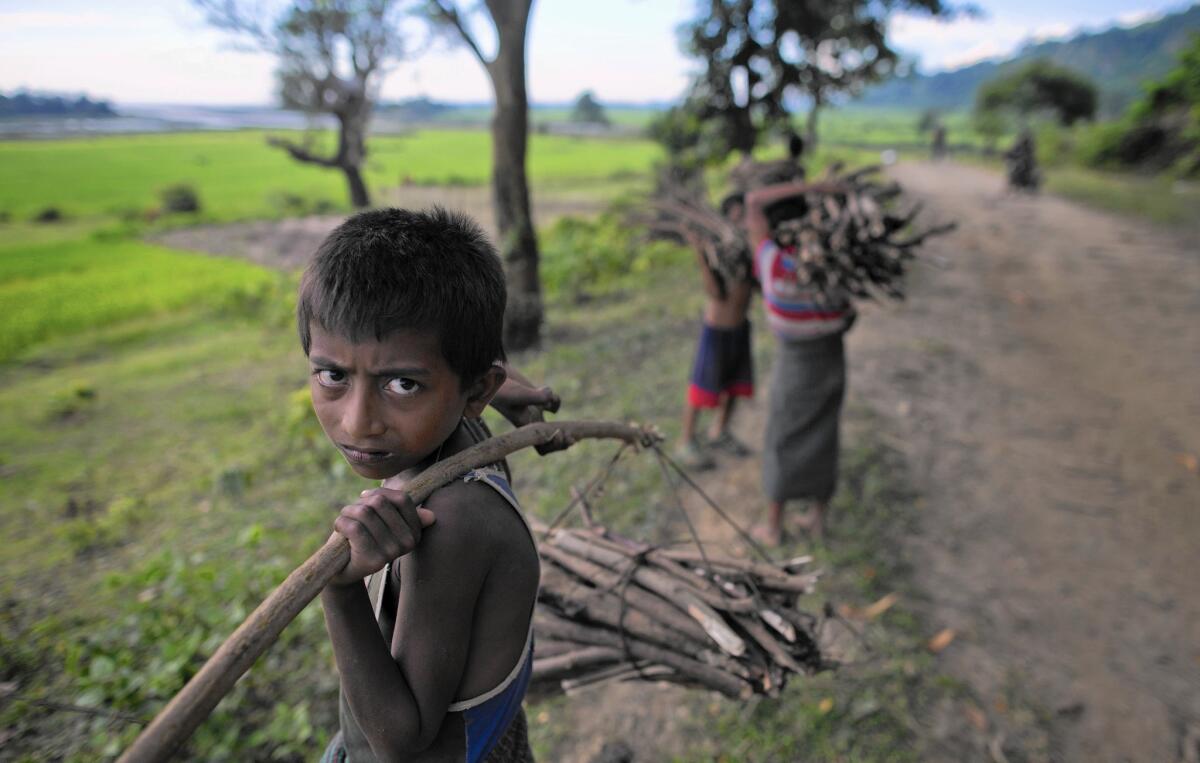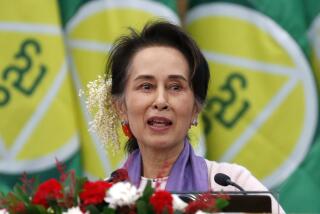Myanmar’s backsliding leads to doubt about U.S. diplomacy strategy

Reporting from Washington — The State Department’s second-ranking diplomat flew to Myanmar in May to urge the country’s leaders not to adopt a tough “population-control” law apparently aimed at halting growth of persecuted ethnic minorities.
President Thein Sein listened politely to Deputy Secretary of State Antony Blinken. And hours after Blinken departed Yangon, he signed the bill into law.
Myanmar’s leaders have repeatedly rebuffed U.S. appeals this year despite a public commitment to reform that led the White House to restore full diplomatic relations in 2012, and to drop most sanctions on the authoritarian government.
Administration officials consider the diplomatic opening to the long-isolated nation, also known as Burma, a marquee achievement in President Obama’s first term. In her presidential race, former Secretary of State Hillary Rodham Clinton is expected to portray the thaw as one of her top diplomatic accomplishments.
But three years later, progress is coming slowly in some areas and there is clear backsliding in others. Critics say the administration was hasty in chalking Myanmar, a resource-rich country wedged between India, China and Thailand, on the win list.
“The administration certainly declared victory too soon,” said Phil Robertson, deputy director for Asia at Human Rights Watch.
After decades with one of the worst human rights records in the world, the military-dominated leadership in Napyidaw, the capital, eased its grip in 2011, freeing 1,300 political prisoners, allowing the opposition more seats in the parliament and permitting more free speech.
But the reforms preceded another crackdown. In recent months, Thein Sein’s government has blocked lawmakers’ attempts to liberalize the constitution, forced a top reformer from leadership of the ruling party and stepped up arrests of opponents and journalists. Analysts worry that the military will reassert control before scheduled parliamentary elections in November.
Critics also cite the harsh treatment of the Rohingya, a Muslim minority group of 1 million that’s become a target of violent attacks by Buddhists and an ethnic cleansing campaign since the country began its transition.
Thousands of Rohingya have fled squalid camps in boats, setting off a regional migration crisis and undermining international support for Myanmar’s government.
Opposition leader and Nobel laureate Aung San Suu Kyi, America’s chief ally in Myanmar, has declined to condemn the government’s tough treatment of the Rohingya.
Obama administration officials continue to press for reforms. Top U.S. officials regularly visit, including Obama and Clinton, who have each gone there twice.
Though “very significant challenges” remain, “the progress is real and it’s significant,” Blinken told reporters during his May visit.
Myanmar’s circumstances have become part of the debate over Obama’s assertions that the United States can do more to reform countries by opening diplomatic and commercial ties, than by isolating them, an argument it recently made when it restored diplomatic ties with Cuba after more than half a century.
In the opening to Myanmar, the administration retained some sanctions but front-loaded most of the rewards. They restored diplomatic relations, dropped most economic penalties, began direct U.S. aid, and took steps to allow U.S. companies and international financial institutions to operate there.
“It was a gutsy move,” said Jonah Blank, an Asia expert at the nonpartisan Rand Corp. think tank and a former Senate Democratic staffer.
Human rights advocates contend that the administration should have kept more leverage to stop the government from backsliding on reforms.
“They’ve been generous with their rhetoric, but they haven’t used the sticks they have to put pressure on the government,” said Simon Billenness, executive director of the U.S. Campaign for Burma, a nonprofit advocacy group.
U.S. lawmakers, many of whom supported the diplomatic opening, are now beginning to call for the use of more penalties.
Rep. Ed Royce (R-Fullerton), chairman of the House Foreign Affairs Committee, and Rep. Eliot L. Engel (D-N.Y.), its ranking minority member, sent a letter to the administration Aug. 11 arguing that Myanmar’s human rights abuses “demand a strong response.”
They urged Treasury Secretary Jacob J. Lew to sanction individual officials.
Supporters of the diplomacy say it has helped pull Myanmar away from its most important patron, China, and brought it closer to the United States and its allies. Administration officials deny that was ever a goal.
But Blank, of Rand Corp., says the policy has scored an important win by that standard. Although Myanmar’s trade with the United States is still not large, its economy is expanding and it is increasingly interconnected with its region and major powers.
“This was one of the few remaining hermit kingdoms in the world,” he said. “Now it’s not going to be part of that club.”
More to Read
Sign up for Essential California
The most important California stories and recommendations in your inbox every morning.
You may occasionally receive promotional content from the Los Angeles Times.











